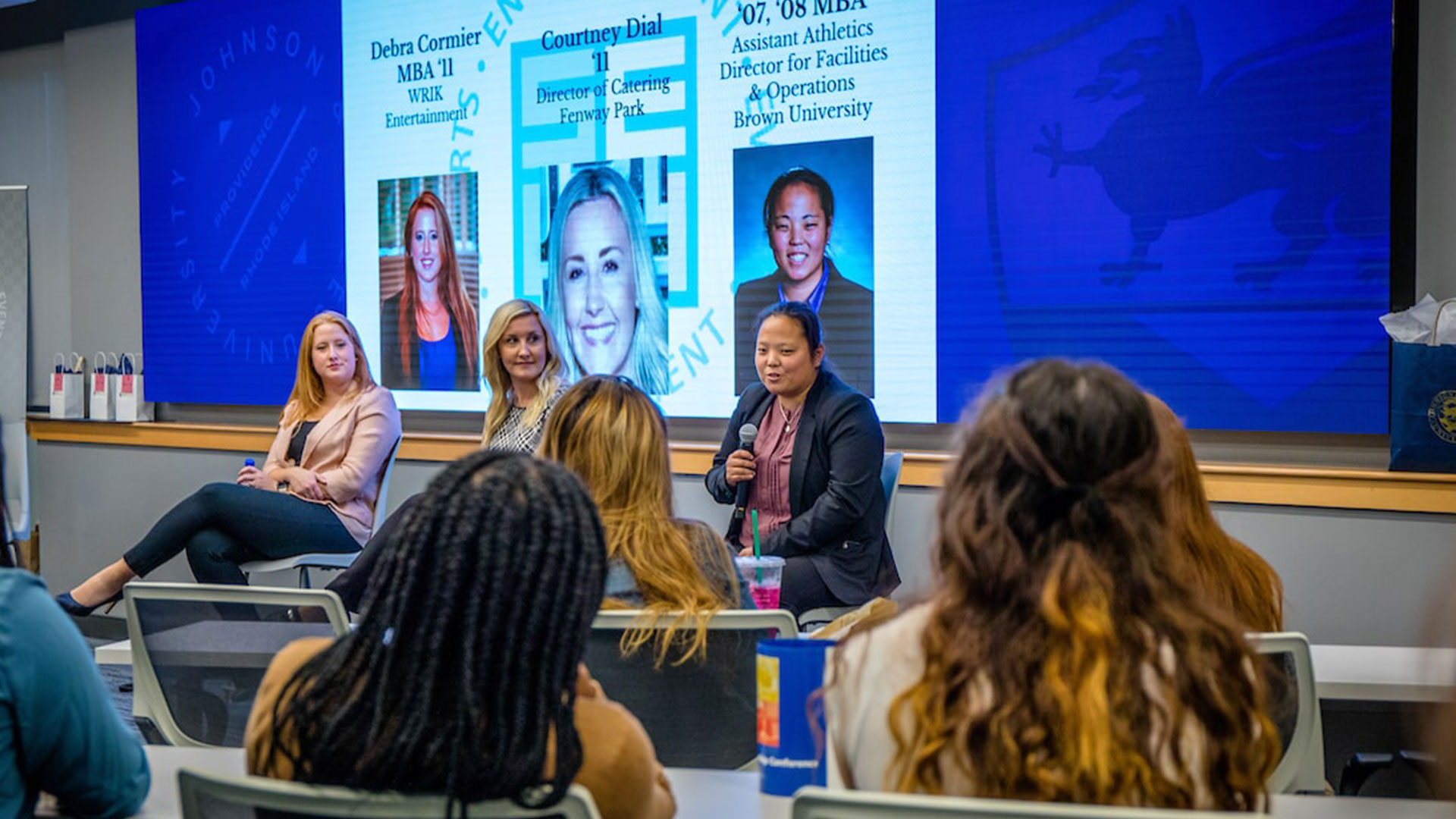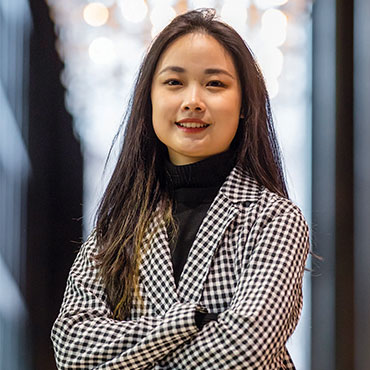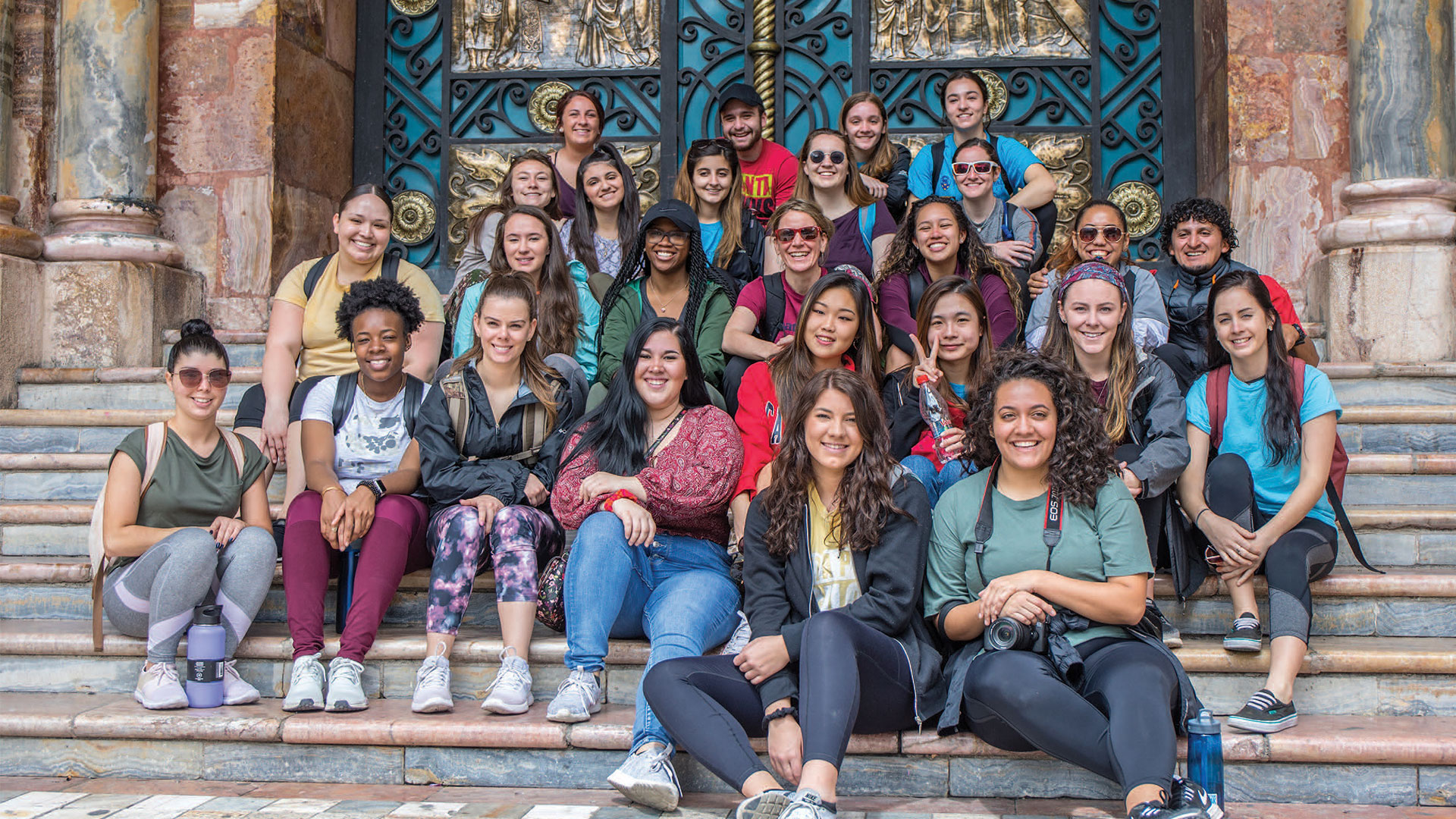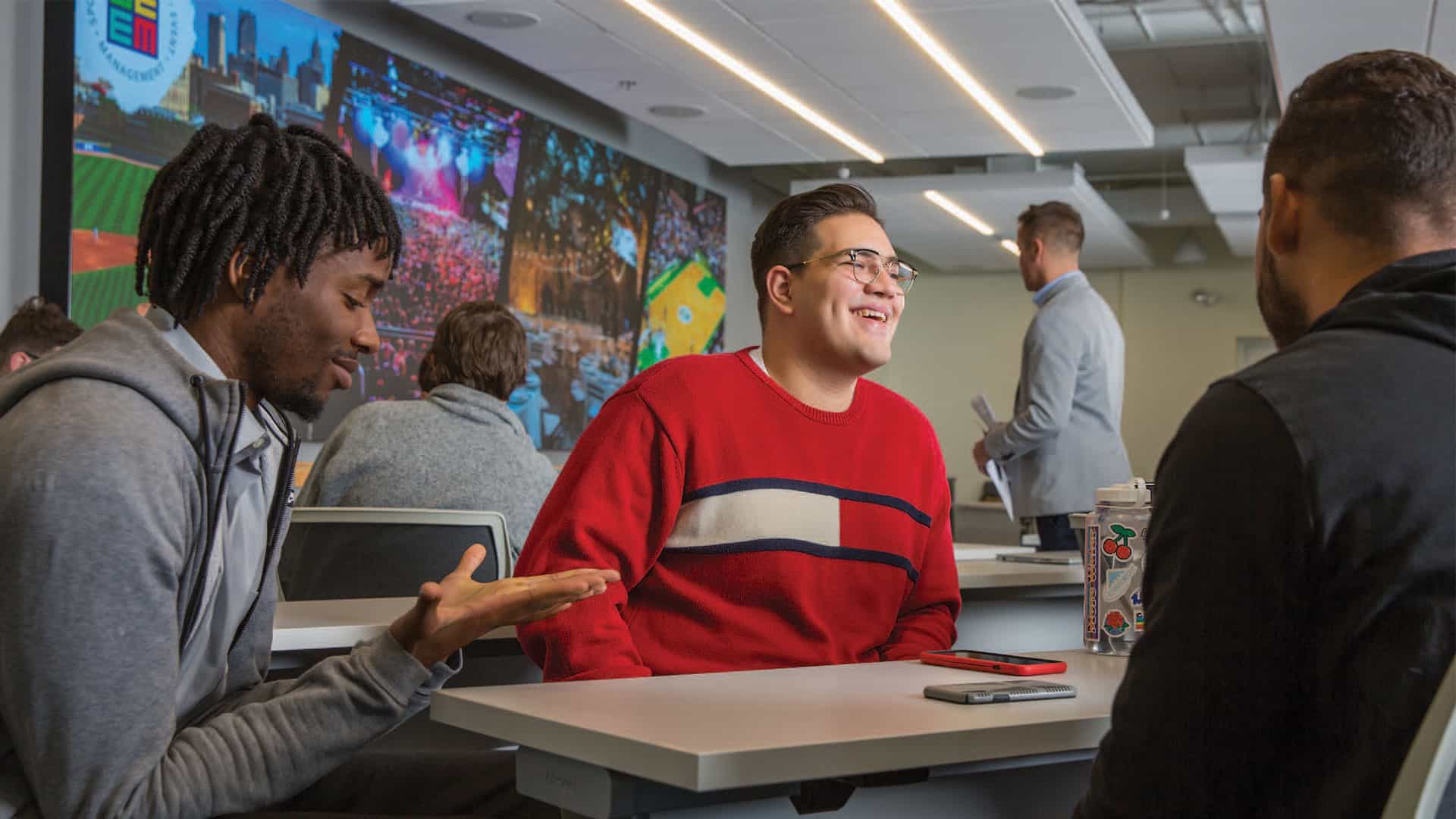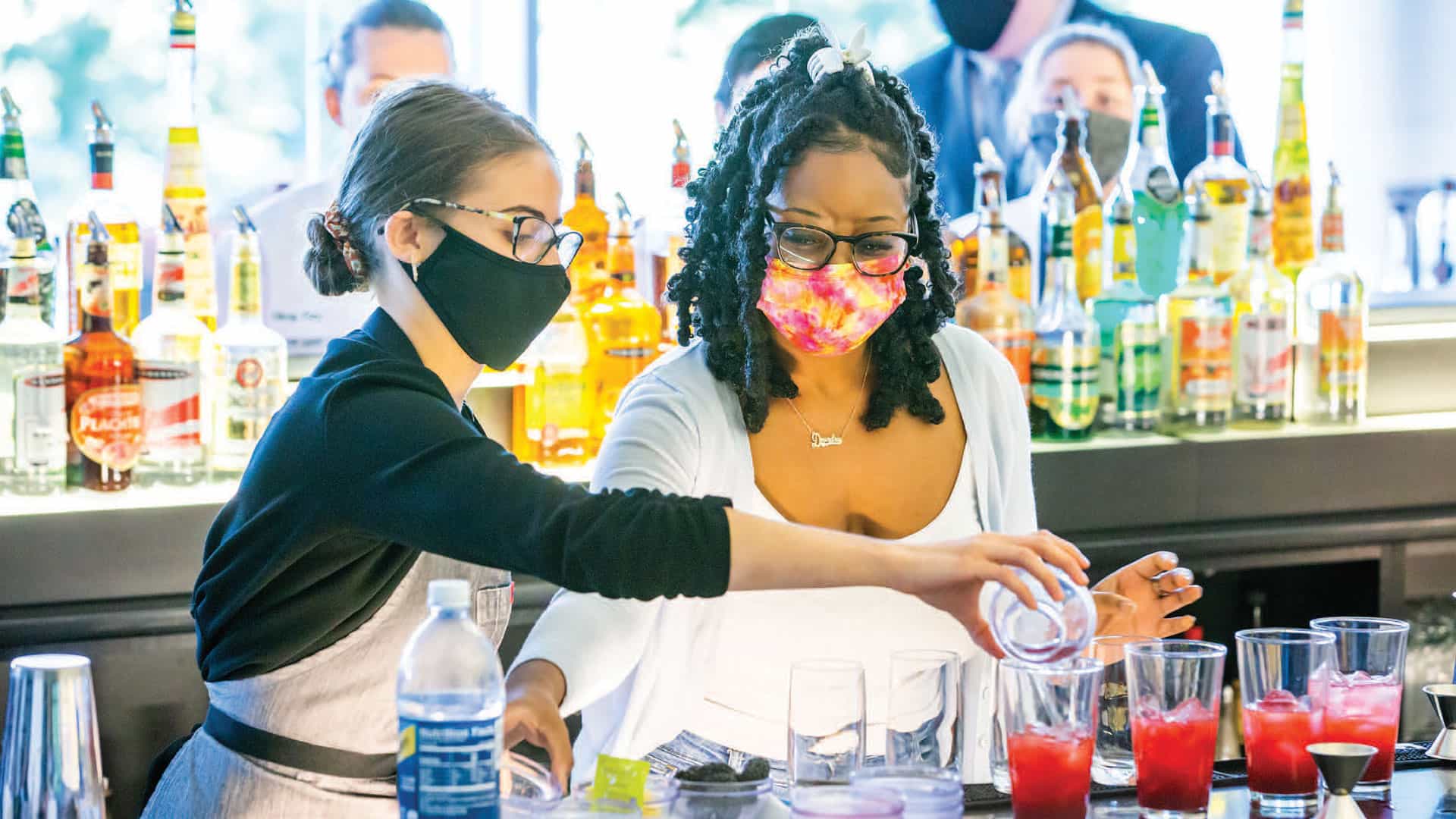Curriculum that keeps students one step ahead of industry needs.
AS THE COLLEGE OF HOSPITALITY MANAGEMENT passes a landmark birthday — 50 years of educating future hospitality professionals — it’s worth noting what has changed, and what has not, for the students of Johnson & Wales.
The changes for students studying to run hotels and organize travel mirror the broader evolutions in those fields. Some shifts in hindsight seem positively tectonic: the ways technology has transformed what it means to be a travel agent or the revolutions in how Americans eat, drink and gather.
Other changes happened more slowly. When she began teaching at JWU in the late ’70s, Caroline Cooper, Ed.D., made a point each year of asking first-year students their earliest memory of eating in a restaurant. Many students had fresh memories of dining out for the first time in their late teens. Restaurants simply weren’t a place where people went as often, and when they went, they were less apt to bring kids. It took roughly a decade before students’ standard answer was that their first time in a restaurant was too early for them to recall. “I’d always get around to the question,” Cooper, now retired, says today. “Because I’m just fascinated.”
From the earliest days at the college, the pedagogy always flowed from real-world experience. It’s not simply interesting to consider a time before children in restaurants; rather, that sort of data point has all sorts of implications for curriculum. Who the customers are at a restaurant, hotel, tour business or event space will inform successful strategies. Hospitality students want to provide them with an amazing experience, because it was probably some experience, at some point in their life, that drew them to pursue a career in hospitality in the first place.
“Hospitality students generally have empathy — they’re a happier group to begin with.”
“Hospitality students generally have empathy — they’re a happier group to begin with,” Cooper says. “They want to enjoy life. They wouldn’t be in this field if they didn’t want to impart good things. It never has been a field where a parent will say, ‘I want you to go into the hotel business.’ Or, ‘I want you to go into travel and tourism.’ A Johnson & Wales student knew they wanted to be in the field, day one.”
JWU EXISTED long before the hospitality program, but the push by then-president Morris Gaebe ’98 Hon., the late JWU chancellor emeritus who died in 2016 at the age of 96, was a defining event in the history of the school. In 1947, along with Edward Triangelo, Gaebe bought the 33-year-old business college from its founders, Gertrude I. Johnson and Mary T. Wales. To keep enrollment up, the entrepreneurs scoured want ads, honing their curriculum to keep their students one step ahead of industry needs. Their early ’70s bet on a hospitality program proved successful. The inaugural class numbered 141 at their enrollment in 1973. Ten years later, enrollment topped 3,000.
At that time Johnson & Wales had three divisions: the business college, the culinary college, and continuing education. Hospitality programs were nested inside the business college. It was the late Peter Van Kleeck, a Cornell University graduate, who organized hospitality into four constituent focuses: hotel management, food service management, travel and tourism, and recreation and leisure event management. True to Gaebe and Triangelo’s vision of a career-focused institution, the school was known for placing students in practical settings as soon as possible and attracted the sorts of students who would work a part-time job during the year. (Students in the ’80s, for instance, did practicum work at a university-owned and-run hotel — a tradition that continues today on the Charlotte Campus, home to the JWU-owned Doubletree Hotel.) In turn, the students never were too keen on instructors who lacked industry experience.
Johnson & Wales College became Johnson & Wales University in 1988 and gained regional accreditation in 1993 from the New England Commission of Higher Education. It was in the early ’90s as well that the hospitality division — having outgrown the other business college divisions combined — split into its own college, a transition overseen by Irving Schneider as dean before he became president of the Providence Campus. Cooper was assistant dean at the time, and took over as dean in 1995. By the time of her retirement in 2012, the college was drawing plaudits as a national top-10 hospitality program, recognition that boosted student recruitment and placement.
“Travel is fatal to bigotry and prejudice.” -Mark Twain
OVER THOSE YEARS, it wasn’t just the restaurant-going habits of incoming students that shifted. The travel industry was in full upheaval, technologically and culturally. In the ’70s and ’80s, JWU got a huge boost from — of all things — the cruiseliner sitcom “The Love Boat.” Campy, flirty, packed with guest stars, the rom-com made travel look like a bullet of poolside fun and black-tie dinners. Applications to the college skyrocketed. It didn’t hurt, too, that airline deregulation after 1978 made air travel cheaper and more accessible than ever before.
In those days the typical graduate was probably working toward becoming a travel agent, or once those jobs began receding, a tourism official or director. The college continued to innovate in nudging students into the world to explore and learn. In 1990 the Los Angeles Times reported on the efforts of undercover JWU students who sussed out the travel-worthiness of major destinations. They had just vetted Atlantic City, New Jersey, where four faculty advisors oversaw 13 students who logged their visits to some 700 different establishments and attractions in the tourism mecca, turning up several service problems along the way. Paul Lacroix, then-chair of the Travel & Tourism Department, told the Times: “The 1980s was a marketing era. Everyone went marketing. Now we have the customers, and my question to students is, ‘What do we do with them?’ I think the ’90s is going to be an era of service. I think it’s a very natural follow-up to what has happened in the ’80s.”
JWU’s International Travel & Tourism Studies Chair Michael Sabitoni ’82, ’92 M.S. joined the college in 1992 as the director of travel internships, in the heyday of corporate travel agencies. The program centered on a working travel agency JWU owned, and was designed to impart the basic skills of the trade — booking a flight, car or hotel. “Those really were the days of living la vida loca for travel agents,” Sabitoni said. “That’s where everyone would go for leisure travel, corporate travel.”
Internships thrust students into the working world, to acclimate them to the ticklish business of interacting with real travelers. In the early ’90s, a passenger arriving at the airport outside Providence would see, as they descended the escalator, an information booth bearing a JWU logo, staffed by students 6am to 11pm, 361 days a year. If that traveler were in town for a trade show, they might also encounter working students at the convention center; if they were inclined to visit the Rhode Island State House, they’d bump into students working there as well, walking grade schoolers through portrait galleries.
“Johnson & Wales provided me the autonomy to really be creative to deliver based on our roots,” Sabitoni says. “And that is experiential education. We evolved from owning our own hotels, travel agencies and our retail store. That spirit is still alive today in our curriculum, which has always been the bedrock of the College of Hospitality Management.”
WITHIN A DECADE, the web had made it a snap for anyone with a laptop to essentially become their own travel agent. And as the methods by which people arranged travel evolved, so did their expectations about what travel entailed. Once the sort of rare, jubilant event that perhaps restaurant meals had been, air travel brought a host of perils as it got cheaper, threatening local cultures, economies and ecosystems. Even teenagers came to realize that the sorts of vacations their parents or grandparents may have enjoyed in the “Love Boat” era needed to be reimagined for a world that valued sustainability. Naturally, the college adapted as well, and now posits the potential of travel and tourism to bring positive change to developing destinations.
“The students today, that’s what they care about,” says Tiffany Rhodes, an associate professor of Adventure & Sustainable Tourism. “They’re living in a world that they’re seeing get blown up. These students want to affect good in the world. And maybe hospitality changed from a position of taking care of the customer first to a position of, let’s take care of the community. Let’s take care of all stakeholders.”
As Rhodes spoke, she was preparing to take a group of students on a Familiarization Tour. Affectionately known as FAM tours, the journeys give students responsibility for organizing components of the group adventure — dining at sustainable restaurants, visiting economically and environmentally responsible attractions.
They learn to manage risk, to evaluate where their money goes and how to communicate and guide a group. Rhodes was readying students for a FAM trip to Jordan (and encouraging them to download “Indiana Jones and the Last Crusade” onto their phones for the flight, to prepare for seeing Petra). Past destinations have included the likes of Zimbabwe, Morocco, Brazil, Argentina, Ecuador, South Africa, Cambodia, Vietnam and Thailand.
“Mark Twain said that travel is fatal to bigotry and prejudice,” Rhodes says. “I always tell my students that we actually are in an industry that can change the world. We are global. We have a lot of economic power.”
Industrywide there’s a lot of optimism about where we’re going.ASSOCIATE PROFESSOR BRYAN LAVIN '11 MBA
REACHED MORE THAN 30 years after he predicted in a national publication that the 1990s would be an era of better service, Paul Lacroix, who retired from JWU in 2001, looked back and offered a reassessment. The 1990s did turn out to be an era of service, he says.
Hospitality at large competed fiercely over service quality, then became complacent, and then suffered a huge blow in the Great Recession. The 2010s were an era that launched budget airlines and budget hotels. Many hospitality colleges that had sprung up in the boom times shrank and shuttered, Lacroix says, because they were merely preparing students to be able to get a job. “Many of those schools that were training for jobs are now closed,” Lacroix says. “They did not survive. JWU, Cornell University, University of Houston — the classic ones, they survived. They were still training for careers.”
Hospitality education suffered another blow during the pandemic. Classes built to prepare students for hands-on experience had to move to Zoom. Nationwide, college enrollment fell. And the College of Hospitality Management continued to evolve as global events shook higher education as well as travel, dining, concerts and all the rest. The Sports, Entertainment, Event — Management (SEEM) students in particular have seen the demands on their specializations ratcheted all the higher.
The prime goal for those entering that industry, says associate professor Lee A. Esckilsen, chair of the SEEM program, was to deliver an exceptional guest experience, whether they’re running a basketball franchise, managing a concert venue or planning a wedding. Now more physical concerns are equally important to consider. “How do you create an environment that keeps everyone safe and secure, without making people feel they’re watching an event with policemen standing over their shoulder?” Esckilsen says. “And how do you do this and still monetize it? It’s an interesting dynamic that we’re educating them for.”
Then again, the sorts of students drawn to those fields have always been detail-oriented, punctual and committed to maximizing the moment. If ESPN says the puck has to drop at 7:05, that’s when the hockey match must start. If Bruno Mars’ sound check takes longer than expected, you still have 18,000 fans on-hand who need pretzels and working water fountains. Students tend to arrive with a passion for sports or music, be that creative or analytical. It’s up to the instructors, Esckilsen says, to stoke those flames while also preparing them to manage an operation that has infinite possibilities bounded by firm constraints.
What’s true in events is the same, after all, of what’s true for a great restaurant meal, a life-changing trip or a blissed-out hotel stay. We’re all here for a good time. And then, we’re not. The pandemic underlined for Americans how fragile — and vital — restaurants, hotels, concerts and other events are if we take them for granted. Along with his colleagues, Bryan Lavin ’11 MBA, an associate professor in the International Travel & Tourism Studies Department, is training the new generation of students to see sustainability as a practice by which communities can invest in and protect their local businesses, to ensure they survive in lean times — no matter what the world throws at them.
“Tourism is back, travel numbers are massive, there’s a ton of demand out there and now there’s a huge need for trained professionals in the industry,” Lavin says. “The students who pushed through the pandemic are positioned to walk into excellent roles. Industrywide
there’s a lot of optimism about where we’re going.”
COVID-19 accelerated many of the changes already afoot in the hospitality industry, forcing educators once again to grapple with how to prepare students for the preferences of a new generation. The fundamentals, Sabitoni says, were already sound. The college has been preparing students for the tech-forward tastes of Millennial and Gen Z customers — people who expect great service, who want to access it via apps and screens, and who will let Tripadvisor, Yelp and Google know if they had a two-star experience. “Everyone’s a critic nowadays,” Sabitoni said. “We learned that even before the pandemic.”
More than ever, interactions with customers carry the potential for online blowback, of reputational damage to a business or brand. The savviest students, then, have to notice and keep pace with customers’ evolving tastes and expectations. For educators, that’s a two-way street. Sabitoni, for one, used to bring a case of bottled water to class for his students. Over the years he watched fewer and fewer students reach for the water, as they opted for reusable water bottles. Once again, students’ values were shifting, this time toward sustainability. The professor read the room and stopped bringing the plastic. Today when the professor lectures on sustainability, he has his own aluminum water bottle beside him. JWU
